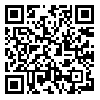BibTeX | RIS | EndNote | Medlars | ProCite | Reference Manager | RefWorks
Send citation to:
URL: http://journal.zums.ac.ir/article-1-3047-fa.html
Background and Objective: Infancy period has an essential role in future health of individuals due to development of human body structure over this period of life. Sufficient nutrition and correct nutritional patterns have great impact on infancy health. The objective of this study was to determine the effect of training on awareness, attitude and practice of mothers who had infants. Materials and methods: This study was a quasi experimental (before and after the intervention) study without a control group. Study sample included 110 mothers referring to health houses of Abhar city who had at least one infant under 1 year old. Before the intervention, knowledge, attitude and practice of mothers concerning complementary feeding were evaluated using a standard questionnaire. Validity and reliability of the questionnaire was tested. Intervention program included training sessions with group discussions and role playing, and social worker as facilitator of the group. Training sessions were held twice a week for 6 weeks. One month after the intervention, knowledge, attitude and practice of mothers were measured. Results: Scores of knowledge and attitude showed a significant improvement after the intervention as compared to before the intervention (p<0.001). In practice domain, mothers had significant changes in choosing of type of complementary feeding, sufficient number of feeding their infants during the day, and proper storage of complementary food after training (p<0.001). Conclusion: Training in supplementary nutrition by health workers through group discussion and role play has an important effect in improving knowledge, attitude and practice of mothers. Referencs 1- Imdad M, Yakoob MY, Bhutta ZA. Impact of maternal education about complementary feeding and provision of complementary foods on child growth in developing countries. BMC Public Health. 2011 11: S25. 2- Kolahdooz F, Najafi F. Report of a national survey: food security information and mapping system in Iran. Tehran: ministry of health and medical education 2012. 3- Demissie S, Worku A. Magnitude and factors associated with malnutrition in children 6-59 months of age in pastoral community of Dollo Ado District, Somali region, Ethiopia. Sci J Public Health. 2013 1: 175-83. 4- Black RE, Allen LH, Bhutta ZA, et al. Maternal and child undernutrition: global and regional exposures and health consequences. Lancet. 2008 371: 243-60. 5- Shi L, Zhang J, Wang Y, Caulfield LE, Guyer B. Effectiveness of an educational intervention on complementary feeding practices and growth in rural China: a cluster randomised controlled trial. Public Health Nutr. 2009 13: 556-65. 6- Lassi ZS, Das JK, Zahid G, Imdad A, Bhutta ZA. Impact of education and provision of complementary feeding on growth and morbidity in children less than 2 years of age in developing countries: a systematic review. BMC Public Health. 2013 13: S13. 7- Houshyar Rad A, Dorosti Motlagh AR, Kalantari N, Abd Elahi M, Abtahi M. Prevalence of stunting, underweight, wasting and overweight among Iranian under-five-year-old children (2000- 2002). Iran J Nutr Sci Food Technol. 2009 3: 49-56. 8- Teimori S, Moezzi F, Eskandari F, Mohajeri M, Khoshnevis P. Survey of prevalence of malnutrition in children 0-6 years old in the community oriented medical education of zanjan university of medical sciences in 2011. Iran J Pediatr. 2013 23: 94-5. 9- Khoshnevisasl P, Sadeghzadeh M, Mazloomzadeh S, Koosha A, Dariabari SN. Maternal knowledge about nutritional status of 6 to 12 month old infants in the community oriented medical education of zanjan university of medical sciences. J Zanjan Univ Med Sci. 2010 18: 61-9. 10- Bhutta ZA, Ahmed T, Black RE, et al. What works? Interventions for maternal and child under-nutrition and survival. Lancet. 2008 9610: 417-40. 11- Sguassero Y, De Onis M, Carroli G. Community-based supplementary feeding for promoting the growth of children under five years of age in low and middle income countries. Cochrane Database Syst Rev. 2012 4: 12- Kulwa KB, Verstraeten R, Bouckaert KP, Mamiro PS, Kolsteren PW, Lachat C. Effectiveness of a nutrition education package in improving feeding practices, dietary adequacy and growth of infants and young children in rural Tanzania: rationale, design and methods of a cluster randomised trial. BMC Public Health. 2014 14: 1077-93. 13- Shi L, Zhang J. Recent Evidence of the effectiveness of educational interventions for improving complementary feeding practices in developing countries. J Trop Pediatr. 2011 57: 91-8. 14- Sadat Hoseini AS, Samiee S, Razaghee N. The effect of nutritional behavior pattern education to toddler mothers on the nutritional pattern improvement of toddlers and mothers performance. Hayat. 2007 13: 33-44. 15- Mazani M, Hamidzadeh Arbabi Y, Nemati A, Mashoufi M, Mahdavi R. Comparing the effectiveness of attendance and nonattendance education of health workers on knowledge of mothers and anthropometric changes of infants. J Health and Hygiene. 2012 1: 74-86. 16- Gartner A, Kameli Y, Traissac P, Dhur A, Delpeuch F, Maire B. Has the first implementation phase of the community nutrition project in urban senegal had an impact? Nutrition. 2007 23: 219-28. 17- Penny ME, Creed-Kanashiro HM, Robert RC, Narro MR, Caulfield LE, Black RE. Effectiveness of an educational intervention delivered through the health services to improve nutrition in young children: a cluster- randomized controlled trial. Lancet. 2005 365: 1863-72. 18- Roy SK, Fuchs GJ, Mahmud Z. Intensive nutrition education with or without supplementary feeding improves the nutritional status of moderately-malnourished children in Bangladesh. J Health Popul Nutr. 2005 23: 320-30. 19- Khazaei T, Amoozeshi Z, Ahmadi S, Safamanesh B, Mahmoodi H. The effect of education on mother's knowledge and practice about supplementary nutrition for children under one year. J Nurs Midwifery Birjand Univ Med Sci. 2008 3: 10-15. 20- Golshiri P, Sharifirad G, Baghernezhad F. Comparison of two methods of education (lecture and self- learning) on knowledge and practice of mothers with under 3 year old children about growth monitoring and nutritional development stages. Iran J Med Educ. 2010 10: 927-36.
دریافت: 1393/12/28 | پذیرش: 1393/12/28 | انتشار: 1393/12/28
| بازنشر اطلاعات | |
 |
این مقاله تحت شرایط Creative Commons Attribution-NonCommercial 4.0 International License قابل بازنشر است. |




